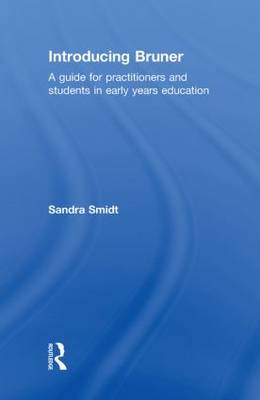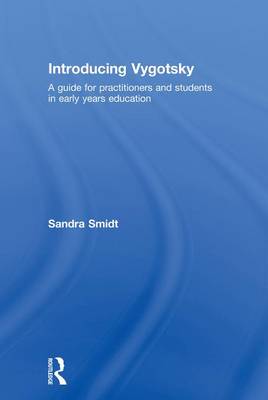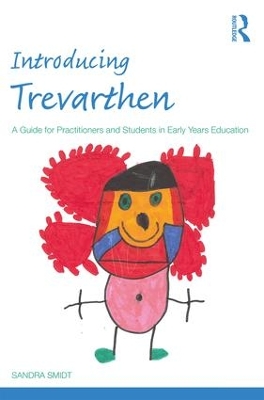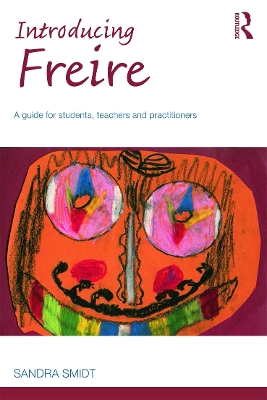Introducing Early Years Thinkers
5 total works
Sandra Smidt takes the reader on a journey through the key concepts of Jerome Bruner, a significant figure in the field of early education whose work has spanned almost a century. His wide-ranging and innovative principles of early learning and teaching are unpicked here using everyday language and the links between his ideas and those of other key thinkers of the twentieth and twenty-first centuries are revealed.
Introducing Bruner is the companion volume to Introducing Vygotsky and is an invaluable work for anyone involved with children in the early years. The introduction of Bruner's key concepts is followed by discussion of the implications of these for teaching and learning. This accessible text is illustrated throughout with examples drawn from real-life early years settings and the concepts discussed include:
- how children acquire language
- how children come to make sense of their world through narrative
- the significance of play to learning
- the importance of culture and context
- the role of memory
- what should children be taught: the spiral curriculum
- how should children be taught: scaffolding and interaction.
The book also looks, crucially, at what those working or involved with young children can learn from Bruner, and includes a helpful glossary of terminology. This fascinating insight in to the life and work of a key figure in early years education is essential reading for anyone concerned with the learning and development of young children.
Sandra Smidt takes the reader on a journey through the key concepts of Lev Vygotsky, one of the twentieth century's most influential theorists in the field of early education. His ground-breaking principles of early learning and teaching are unpicked here using every-day language, and critical links between his fascinating ideas are revealed.
Introducing Vygotsky is an invaluable companion for anyone involved with children in the early years. The introduction of Vygotsky's key concepts is followed by discussion of the implications of these for teaching and learning. Each chapter also includes a useful glossary of terms.
This accessible text is illustrated throughout with examples drawn from real-life early years settings and the concepts discussed include:
- mediation and memory
- culture and cultural tools
- mental functions
- language, concepts and thinking
- activity theory
- play and meaning.
Essential reading for all those interested in or working with children, Introducing Vygotsky emphasises the social nature of learning and examines the importance of issues such as culture, history, language, and symbols in learning.
Loris Malaguzzi is recognised as the founder of the extraordinary programmes of preschool education that developed after the war in Reggio Emilia, Italy. Deeply embedded in the cultures and communities they serve, these unique preschools have justifiably become famous throughout the world.
In this accessible and engaging text, Sandra Smidt examines how Malaguzzi's philosophy developed out of his personal experiences of growing up in post-fascist Italy. His ideas are explored and illustrated throughout by examples relating to everyday early years practice. The key themes explored include:
- relationships - the importance of relationships, culture and contexts to learning within any setting and beyond;
- transparency - the importance of listening and documentation to understanding and sharing learning;
- questioning - inviting children to not only answer questions but raise them, allowing them to be equal partners in all learning situations;
- creativity - finding ways of enabling children to use all the expressive languages they can find to express and share their ideas;
- equity and fairness - involving the community in all decision-making and discussions, to ensure that early childhood education is accessible and relevant to all children.
This book will be of benefit to all those working with young children and essential reading for students on early childhood education programmes.
Colwyn Trevarthen’s seminal work has earned him a place alongside the most prestigious thinkers, writers and researchers into human development. He is universally acknowledged as the pre-eminent expert on foetal, neonatal and early childhood development. Sandra Smidt examines the impact of his scientific training, linked to his interest in how filmed episodes of mother or father/baby interactions might inform his understanding about early sociocultural development, encouraging us to view the human infant with fresh eyes and realise how purposive human behaviour is from the start. His interest in and collaborations with others introduce the reader to the idea of communicative musicality which, together with physical movement, lead the child to acquiring language. This book focuses on the earliest years of life and makes complex ideas accessible and applicable to a range of settings.
As well as providing a glossary of key terms and an introduction to the life and work of Trevarthen, the book is split into three parts: From foetus to neonate, The remainder of the first year of life and From one to three. Each part offers case studies, practical examples, draws on recent research evidence and includes helpful pointers for students, labelled ‘Think about this’. This essential guide to his work will be of interest to professionals working with children in early childhood settings and to undergraduate students training to become early childhood professionals.
The famous Brazilian educator Paulo Freire has influenced educators, teachers and students in a broad tapestry of contexts and countries, as he challenged conventional thinking on how teachers ought to teach and learners ought to learn. By making his ideas accessible and relevant, this insightful and thought-provoking text draws out the relevance and topicality of Freire’s work and applies this to a wide range of educational settings, from adult education, through schools, to early years settings.
Themes covered include:
- the lasting impact of illiteracy;
- the benefits and potential in becoming literate;
- literacy, language and power;
- the differences between banking and dialogic education;
- the social and political nature of learning.
- what kind of teaching and learning do we want?
Using a variety of practical examples and case studies, Introducing Freire is an essential guide to the work of one of the most significant figures in education in the last century. Fascinating and accessible, this book is for anyone interested in teaching and learning, poverty and affluence, power and powerlessness, and society and change.




